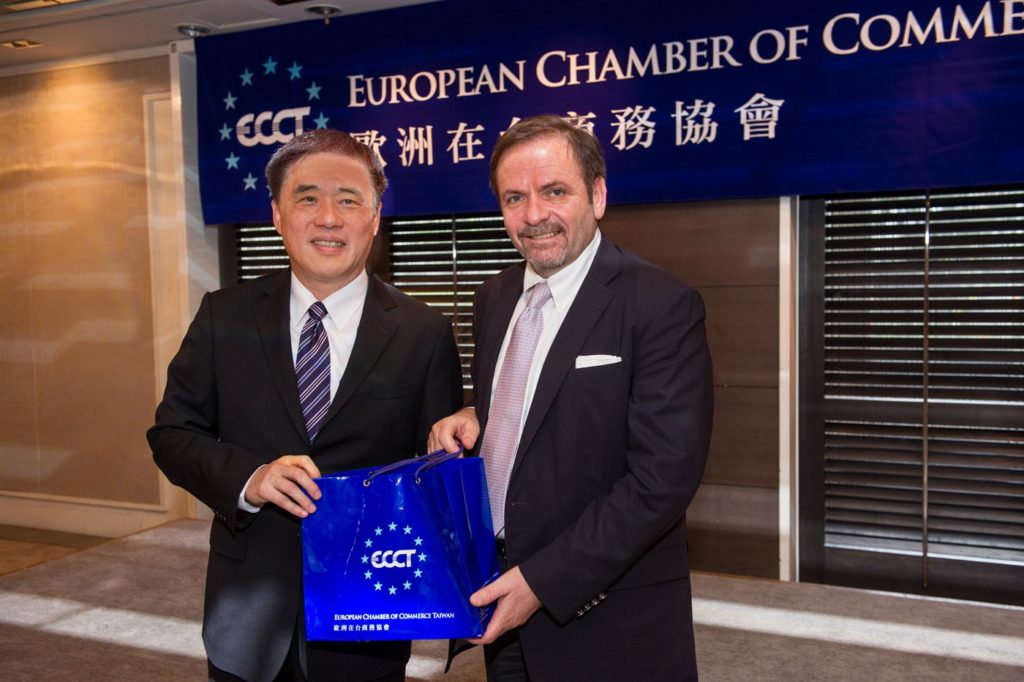ECCT hosts roundtable lunch with Taipei Mayor Hau

In his opening remarks ECCT Chairman Giuseppe Izzo noted that this was the 14th consecutive annual roundtable lunch with the TCG, which is designed to strengthen the already good relations the ECCT enjoys with its home city. He commented that the meeting builds on other ongoing cooperation in other fields. As one example, he cited the ECCT's partnership with the TCG to co-host several forums and roundtable meetings at the Eco-Products International Fair from 13-16 March. During these meetings, participants discussed a number of topics related to sustainability including how to improve and increase the use of sustainable transport, green buildings and smart energy in the city and how to make the 2017 university games are as green and sustainable as possible. This, the chairman said, was a good example of how European companies and the city are working together to make Taipei city cleaner, greener and attractive for investors and as a place to live.
In his speech Mayor Hau lauded the long and close relationship the Taipei City Government has enjoyed with the ECCT and thanked the chamber for its continued support and cooperation. Mayor Hau said that the annual roundtable had become an important platform for the TCG to work together with the ECCT to make Taipei an even better place to live and to do business.
Noting that he was in the last year of his second four-year term, Mayor Hau spoke about the significant progress that has been made over the past seven years. The mayor said he was particularly proud of the huge improvements made in public transport, including the opening of one new metro (MRT) line every year, the upgrade of the city's roads, several successful events (such as the 2009 Deaflympics and the 2010-2011 Flora Exposition) and the YouBike system.
Traffic on the city's MRT lines has reached an average daily volume of 1.7 million trips. According to the mayor, the next line under construction, the Songshan line, will be open for business by the end of the year. The mayor noted that the city's large-scale renovation of its roads was partly attributable to a recommendation made by the ECCT at a roundtable lunch seven years ago. Shortly after that meeting, the city embarked on a "smooth road project" to improve the quality and safety of the city's roads. According to the mayor, over the past seven years 6.4 million square metres of road surfaces have been repaved and the city plans to finish repaving all major roads in the city by the end of the year.
The city's YouBike public bicycle rental scheme took a few months of trial and error but after initial teething problems the project has been an outstanding success. While Taipei city initially looked to Paris to learn about their public bicycle system, other cities are now looking at Taipei as an example. The YouBike turnover rate is now seven to twelve times and the theft rate is extremely low. The system will have 162 stations by the end of July this year and will be expanded to Xinbei city. Mayor Hau said that the YouBike system is an important component of "last-mile" public transportation that is part of the city's commitment to lower carbon emissions.
The mayor also mentioned major construction projects, the city's free wifi system and the 1999 service hotline as examples of efforts to improve the quality of life for Taipei residents. Besides the improvements in the city's "hardware", the mayor also commented that the city has impressed the world with its highly qualified talent pool and of course very friendly people.
While Mayor Hau will leave office at the end of the year, he has secured two showcase events for his successor. Taipei has been chosen as the World Design Capital for 2016. The programme will focus on issues of sustainability, the balance between innovation and a respect for nature. The city will stage events under the theme "Adaptive City - Design in Motion". The programme will aim to make the city more attractive and efficient, as well as improve Taiwan's standing within the global design network. The city is also making preparations for the 2017 University Games (the Summer Universiade). The 12-day games will be Taipei city's largest international event ever that will share a NT$39.5 billion budget.
While Mayor Hau is justifiably proud of his performance and legacy, he admitted that there is plenty of work left for his successor to do. The most challenging task for the next mayor will be to continue with the process of urban renewal. The mayor said that two projects, one in Shilin and one on Zhongxiao East Road are now ready to go ahead after a protracted period of negotiations with stakeholders. Given the sensitivities of having to deal with multiple interests, urban regeneration is always going to be difficult but the resolution of these two difficult cases shows that, with hard work, it is possible to find solutions and make progress.
